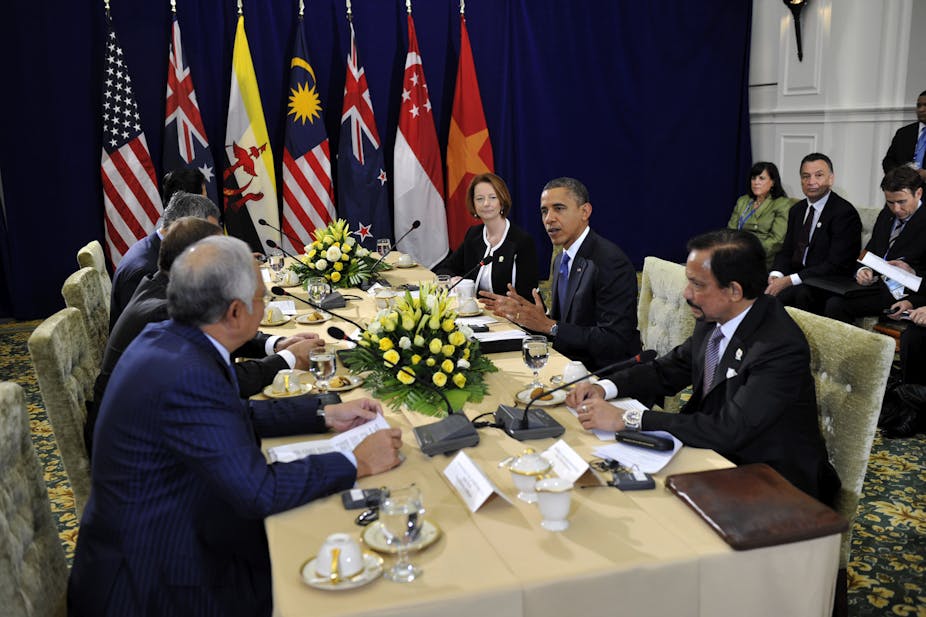International trade agreements bring new transnational food companies into countries, along with new food advertising and promotion.
This has often led to an increase in unhealthy foods entering the domestic market. But an agreement currently being negotiated could go even further and increase the influence of the food industry on domestic regulatory regimes and policies.
The Trans Pacific Partnership (TPP) has been under negotiation since 2010, including Australia, Brunei, Canada, Chile, Malaysia, Mexico, New Zealand, Peru, Singapore, the United States, and Vietnam. (Japan has recently joined the negotiating table but China is notably absent.)
More than any other trade agreement, the TPP is focused on economic integration, investment and the rights of investors, which, for the most part, are international corporations.
Opening up domestic markets influences national diets by altering the availability, quality, price and desirability of foods. And that raises concerns about under-nutrition, obesity and chronic diseases.
There is concern the TPP will invoke the same risks to nutrition and health as existing multilateral and free trade agreements – through tariff reductions, encouragement of foreign investment and enhanced intellectual property rights for corporations.
On the face if it, reductions in barriers to trade should increase consumer food choices and improve supply for net-food importing countries. But trade liberalisation through multilateral and free-trade agreements has traditionally resulted in disproportionately large increases in imports and domestic production of foods that are high in saturated fat, highly processed, calorie-rich and nutrient-poor.
In a number of the Pacific Island nations, for instance, multilateral and regional trade agreements have undermined domestic agriculture and created a strong reliance on imports. This has led to high levels of fat consumption through cheap imports of margarine, butter, meat, chickens and canned meat.
The Central America-USA Free Trade Agreement has promoted greater availability of highly processed foods in Central American countries, by facilitating more imports. And similar trends have been observed with the lowering of trade barriers between Mexico and the United States following the signing of the North American Free Trade Agreement.
Indeed, research has demonstrated that greater foreign direct investment through trade agreements with the United States significantly increases the consumption of soft drinks within the signatory country, magnifying the risk of chronic diseases.
The TPP may go even further by giving companies more power than other agreements. The Australian government has noted “the TPP is more than a traditional trade agreement; it will also deal with behind-the-border impediments to trade and investment.” The way in which these behind-the-border impediments to trade and investment will be addressed could create significant risks for a healthy food supply.
The Trans Pacific Partnership is likely to provide stronger investor protections and enable greater (food) industry involvement in policy-making. It could lead to sweeping changes to domestic regulatory systems, and open up new opportunities for companies to appeal against domestic policies they consider to be a violation of their privileges under the agreement.
Together, these changes would weaken the ability for governments to protect public health by, for example, limiting imports and domestic manufacturing of unhealthy foods and drinks.
At the 15th round of negotiations in Auckland last December, the Malaysian government - supported by the United States - reportedly suggested restricting the amount of information food companies would be required to provide about ingredients and formulae of processed food products.
These sorts of proposals raise concerns about consumer access to information about food products, as well as the ability of governments to regulate food labelling on public health grounds. Measures like that one will undermine health policy goals and extend the control of the food industry over domestic policy.
Re-balancing food industry influence in the negotiation process with input from the health sector is vital.
Public health advocates and health policymakers must engage with trade negotiations to preserve policy space for public health goals before the window of opportunity closes.

